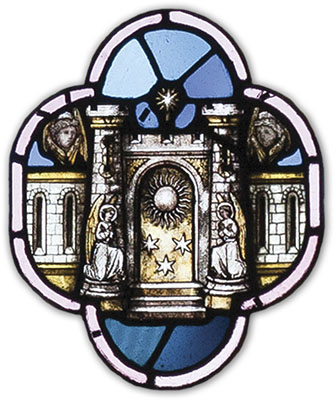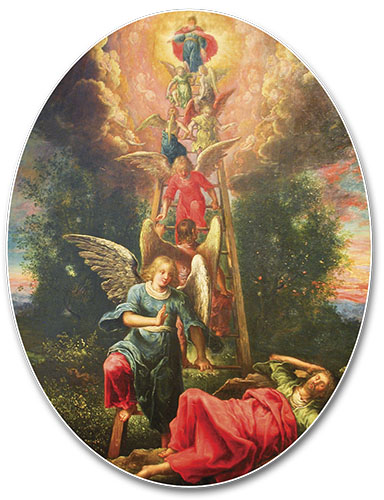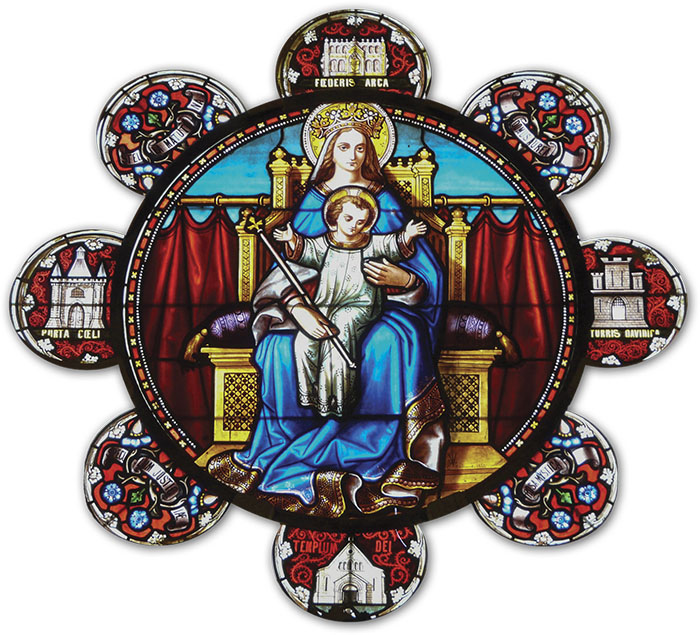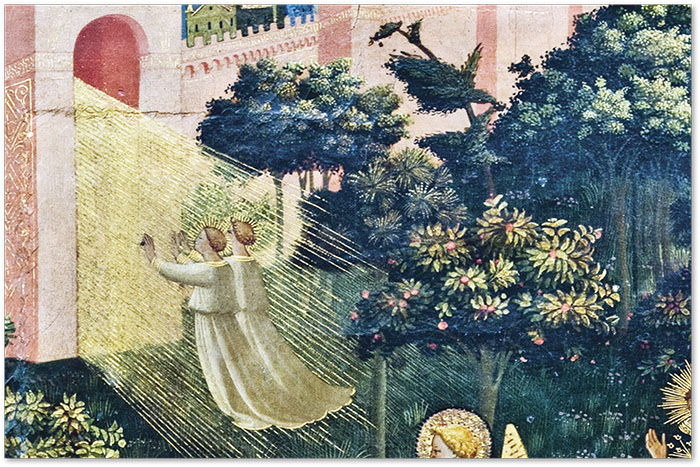Few figures inspire more respect than the patriarchs of the Old Covenant – Abraham, Isaac and Jacob – whose story, by determination of the Divine Holy Spirit, was perpetuated in the pages of Sacred Scripture. Their lives were full of promise and symbolism, and the misfortune that Jacob faced in his youth is a cogent example of this.
Since Isaac, his father, was already an old man, ill and with weakened eyesight, the responsibility for the family rested on the shoulders of his mother, Rebekah, especially regarding the future of their two sons.1 But a deep enmity had developed between them, and Esau sought to kill Jacob.
What protection could she provide for the younger son, so good and innocent, but incomparably inferior in physical strength to the elder? Her heart torn, Rebekah found no other solution: she sent Jacob to a distant land, where he could stay at the house of a relative, Laban, thus escaping Esau’s fury. Having taken leave of his parents, perhaps thinking that he would never see them again, the bearer of the promise departed.
Without the current means of transport, the journey would have taken several days. So when the sun set at the end of the first day, the young man still had a long way to go. He stopped to rest, with no other comfort than a stone for a pillow. In the darkness of that night, something sublime happened: in his dream, Jacob saw an immense ladder, on which Angels were ascending and descending. Awakening from his sleep, he exclaimed: “How awesome is this place! This is none other than the house of God, and this is the gate of Heaven” (Gn 28:17).
A House that God built for Himself
Perhaps the great Temple of Solomon – built centuries later by skilled but human hands, with precious but perishable wood – was the most splendid reflection of the “house of God” that Jacob contemplated on that occasion. Yet God Himself is the architect of the true House of God, and its memory will not perish: all generations will proclaim Her blessed (cf. Lk 1:48), because the One whom Heaven and earth could not contain was carried in her womb.
This Temple is Mary Most Holy, in whom “God dwelt not only by nature, by essence, presence and power, as in the world; not only by grace, through faith, hope and charity, as in the Church; not only by glory, through the vision of the Supreme Good, through the enjoyment and perpetual possession of that infinite treasure, as in Paradise; but was present in Her by bodily indwelling.”2
Although in time Mary was not the first of the creatures to come forth from the hands of the Most High, God already knew her name and had chosen Her for Himself even before the fish leaped in the waters, the birds crossed the sky, and the fruits multiplied on the bountiful earth. This is the teaching the Church, expressed by Pius IX in the Bull Ineffabilis Deus: “[The Creator] from the very beginning, and before time began, chose and prepared a Mother. In Her, the Son of God would become incarnate, and from whom, in the blessed fullness of time, He would be born into this world […] Above all creatures did God so love Her that truly in Her was the Father well pleased with singular delight.3
Who is like unto Mary?

In the springtime of life, hopes illuminate man’s path, dreams fill his mind and the future beckons him, smiling. However, there is no one who does not experience, after a few or many years, what we call frustration, either when expectations are not met, or when something could have been better than it was. However, the cruellest disappointments that wound the deepest recesses of the soul are not caused when aspirations or projects fail, but when someone whom one admired turns out to be less perfect than one imagined, or even unworthy of such consideration.
Now, who among the descendants of Adam is free of defect? Physical flaws, moral shortcomings, temperamental or character deficiencies… To at least one imperfection, all are subject! All, it is true, except Mary, who is a safe port to guide and strengthen those who are bewildered by the disappointments of earthly life.
Of all human beings, Mary is the only one who could not be better than She is,4 for it was fitting that She whom God would call “Mother” should be so pure that it would be impossible to conceive of greater purity apart from God.5 In the days of eternity, before time, the Creator “thought” of Mary and, in His love of predilection, could not have conceived Her more perfect.
This is a truth built upon solid foundations, and not just a play on words and ideas arranged for literary purposes to encourage souls bereft of hope.
Blessed by her fruit and her holiness
St. Bonaventure6 teaches that we can contemplate the Blessed Virgin under three aspects: in the grace of her conception, in the grace of sanctification and in her bodily nature.
Although a daughter of Eve, Our Lady did not inherit a nature that was debased by sin, and her human qualities are excellent in the highest degree. We need only mention that her intelligence, for example, besides being strengthened by infused knowledge, is so penetrating and comprehensive that it surpasses that of all the wise men of history, as St. Bernardine of Siena explains: “How great is the difference between your understanding and Mary’s? It is enormous, like that of understanding the leg of a fly and understanding all things. […] But let me give a better example: take the understanding of all learned men and consider what they understand about God’s creatures, and add St. Augustine, who, contemplating them, said much that is noble about them: I say that all of this is nothing in comparison with Mary’s understanding.”7
Upon this spotless nature, God poured out abundant and unfathomable graces, as indicated by the greeting that the Archangel Gabriel addressed to Her at the Annunciation: “Hail, full of grace.”
To comprehend the reality expressed by the word full, we must consider the size of the container. A thimble may be full, it is true, but it will not contain the same amount as a large barrel that is also full to the brim. Now, what would be the volume of the treasure kept in a “vessel” capable of containing the Infinite, God Himself? Such is Mary, and thus we glimpse the magnitude to which we refer when we call her “full of grace”.8 The Fathers – both Greek and Latin – did not dare, in their wisdom, to measure the grace that dwells in Mary’s soul, considering Her an abyss unfathomable to anyone but God.9

Throughout the ages, the Church has sought terms to match the elevation of Mary, without finding them. The piety of the faithful succeeded only in consecrating the term Blessed Virgin, reserving it exclusively for Our Lady. Summing up centuries of tradition and theology, Pius IX conferred the seal of papal authority on this Marian privilege by proclaiming the dogma of the Immaculate Conception: “The most glorious Virgin was resplendent with such an abundance of heavenly gifts, with such a fullness of grace and with such innocence, that She is an unspeakable miracle of God – indeed, the crown of all miracles and truly the Mother of God; that She approaches as near to God Himself as is possible for a created being; and that She is superior to all the praise of men and Angels.”10
Strongly accustomed to the competition that reigns in today’s society, marked by the egoistic mentality according to which the greater must always crush and despise those who are somehow inferior, we run the risk of ascribing the same way of being to Our Lady, judging, even implicitly, that She will despise the other beings beneath Her, or that, absorbed with her own holiness, She will not even consider them. Nothing could be further from the love that overflows from her Immaculate Heart! Thus St. Bernard exclaims: “She opens the bosom of her mercy to all, so that all may receive from its fullness: the captive, his freedom; the sick, his healing; the sinner, pardon; the just, grace; the Angel, joy; the Trinity, entire glory, and the Son, human flesh. Nothing is hidden from her warmth.”11
House of God… and Gate of Heaven!
In order to gain a better idea of the immeasurable goodness of the Blessed Virgin, let us recall an episode narrated by Dona Lucilia Corrêa de Oliveira.
While still a young girl, she lived in a spacious and dignified house, in the small city of Pirassununga, in the interior of São Paulo. Her father was a lawyer and defended several causes in the region, assuring a dignified life for his family. However, there was a certain time when the family’s reserves were depleted and he was left with just one coin… Serene because the larder was full, he carried on with the family routine, waiting for the situation to improve. It was then that a beggar knocked at the door of the house and, pleading for charity, held out his hat. The head of the family then took that last coin and, trusting that God would take care of the future, gave it to the man.
Now, Our Lady has not just one coin, but the fullness of sanctity. And incomparably greater than the compassion of Lucilia’s father on that occasion, is the mercy of Mary when we, in humility, stretch out our hand to Her and implore her help.
In Jacob’s dream, Angels descended and ascended the ladder; through Mary, God Himself descended to earth, and it is through Her that all men may ascend without fear to the Most High. Being the Mother of Christ, Our Lady became the link that united God to man, and consequently man to God. Thus She is not only the “House of God”, but also the “Gate of Heaven”.

Many Church Fathers have lifted up their voices to praise Her for this reason: “Just as Jacob saw Heaven united to earth at the ends of the ladder, so You [Mary], fulfilling the office of mediator, have united what had been torn asunder”;12 “Hail to Thee, full of grace, mediator between God and men, so that, when the wall of enmity has been destroyed, heavenly and earthly things may be united.”13
Perhaps Mary is waiting for humanity to come forward humiliated, hat in hand, recognizing itself as sick, sinful and captive, in order to open to it treasures of grace hitherto unknown. Yes, Our Lady longs to pour out her mercy on this humanity which, over the course of the centuries, has so insistently sought the upward path of progress, but has ignored the only sure ascending Stairway it should climb; this humanity which has longed to find its fulfillment in this world, has sought in vain for a shortcut to happiness, but has distanced itself from Her who is the Gate of Heaven.
When this happens, the world will have found peace in Mary, and will give the Trinity due glory; then Our Lady will establish her Reign, for “It was through the Blessed Virgin Mary that Jesus Christ came into the world, and it is also through Her that He must reign in the world.” 14 ◊
Taken from the Heralds of the Gospel magazine, #175.
Notes
1 In this regard, see the article: The Promise of Abraham in the Hands of a Woman, on pages 24 and 25 of this issue.
2 ST. LAWRENCE OF BRINDISI. Marial: María de Nazaret, Virgen de la plenitud. Madrid: BAC, 2004, p.103-104.
3 PIUS IX. Ineffabilis Deus, n.1.
4 Cf. ST. THOMAS AQUINAS. Summa Theologiæ. I, q.25, a.6, ad 4.
5 Cf. ST. ANSELM OF CANTERBURY. Oratio VII. In: Obras Completas. Madrid: BAC, 1953, t.II, p.318.
6 Cf. ST. BONAVENTURE. In I Sent., dist.44, dub.3. In: Opera Omnia. Parisiis: Ludovicus Vivès, 1864, t.II, p.161.
7 ST. BERNARDINE OF SIENA. Sermons. Siena: Tipografia Sociale, 1920, p.103.
8 Cf. CONRAD OF SAXONY. Speculum Beatæ Mariæ Virginis. Florentiæ: Quaracchi, 1904, p.60-61.
9 Cf. TERRIEN, SJ, Jean Baptiste. La Madre de Dios y Madre de los hombres: según los Santos Padres y la Teología. Madrid: Voluntad, 1928, t.II, p.243-244.
10 PIUS IX, op. cit.
11 ST. BERNARD OF CLAIRVAUX. Sermón en el Domingo de la octava de la Asunción. In: Obras Completas. 2.ed. Madrid: BAC, 2006, v.IV, p.397.
12 ST. JOHN DAMASCENE. Or. I. In Dormit., apud ALASTRUEY, Gregorio. Tratado de la Virgen Santísima. 3.ed. Madrid: BAC, 1952, p.719.
13 BASIL OF SELEUCIA. Or. in Annunt., apud ALASTRUEY, op. cit., p.719.
14 ST. LOUIS-MARIE GRIGNION DE MONTFORT. True Devotion to Mary, n.1. In God Alone, Bay Shore, NY: Montfort Publications, 1987, p. 291.

